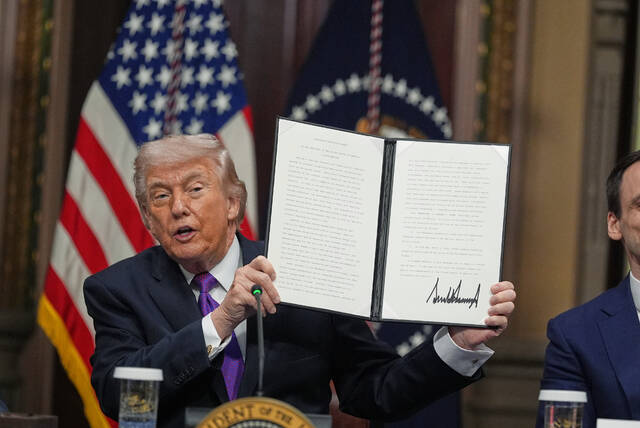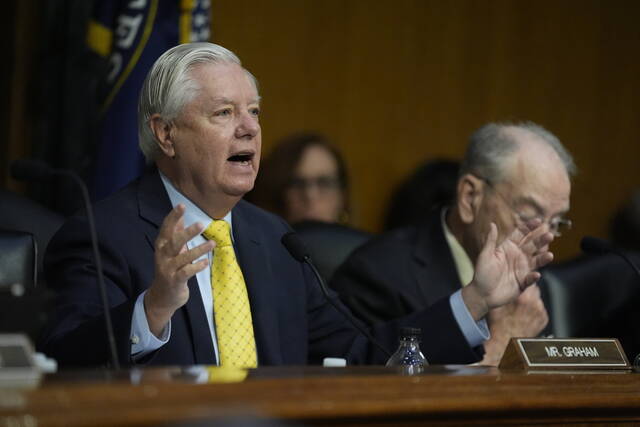WASHINGTON ‒ The Senate is set to vote Thursday on a Republican-backed bill to pay some federal workers who are working through the government shutdown as the shutdown rolls into Day 23.
The bill, known as the Shutdown Fairness Act and sponsored by Sen. Ron Johnson, R-Wisconsin, would pay employees such as air traffic controllers, military members, border patrol agents and other so-called “essential” workers forced to work during the shutdown.
The bill creates a tough spot for Senate Democrats, who are expected to block the bill, which needs 60 votes in the Senate to overcome a Democratic filibuster. Democrats have argued the Trump administration shouldn’t get to decide which employees are essential and not and which should be paid.
Democrats pushed a countermeasure to try to pay all federal employees, but the Republican-controlled Senate did not take up the proposal.
For the 12th time on Wednesday, Senate Democrats blocked Republicans’ short-term funding bill to reopen the government. Democrats have demanded that extending expiring subsidies in the Affordable Care Act and reversing Republicans’ Medicaid cuts be included in legislation to end the shutdown.
Republicans block Democrats’ bills to pay federal workers
Ahead of their vote Thursday afternoon on the GOP’s bill to pay certain federal workers during the shutdown, Republican lawmakers blocked two other, more expansive pay measures authored by Democrats.
The first was a bill introduced by Sen. Chris Van Hollen, D-Maryland, called the “True Shutdown Fairness Act.” It would pay all military service members, federal workers and contractors during the shutdown while barring the White House from issuing any further layoffs.
“No federal employee should have to bear the pain of a situation they had nothing to do with,” Van Hollen said on the Senate floor Thursday.
The measure was blocked through a procedural mechanism by Sen. Ron Johnson, R-Wisconsin, whose more limited pay bill is also expected to fail later in the afternoon due to Democratic opposition.
“I honestly hate to object to this,” Johnson said. “I don’t want to. But this is not the way to pass it.”
The other failed bill was dubbed by Sen. Gary Peters, D-Michigan, as the “Military and Federal Employee Protection Act.” It would retroactively pay federal employees from Oct. 1, the day the shutdown started, through the date the bill would hypothetically take effect.
What is the Shutdown Fairness Act?
The Shutdown Fairness Act, which Senators will vote on but likely not pass, would pay federal workers who have continued to work during the government shutdown.
The bill would restore paychecks to federal workers such as troops, border patrol agents, air traffic controllers, and TSA agents, House Speaker Mike Johnson said at a news conference on Thursday.
Roll call votes for the bill begin at 12:15 p.m. but Democrats are expected to block it from reaching the 60 votes that are required to advance it.
Increased flight delays, cancellations at airports if shutdown continues: Transportation secretary
Transportation Secretary Sean Duffy on Thursday warned of increased flight delays and cancellations as the government shutdown continues.
“I can’t guarantee you that your flight is going to be on time,” Duffy said at a news conference with GOP lawmakers. “I can’t guarantee you that your flight’s not going to be canceled. It’s going to depend on our air traffic controllers coming in to work every single day.”
Duffy said that air traffic controllers next Tuesday will not receive a paycheck for the work they’ve done in October and that has led some workers to take on a second job like driving for Uber or delivering food with Door Dash.
With fewer air traffic controllers, there will be a limited number of flights going in and out of airports to maintain safety, Duffy said.
“We have to talk about the real consequences of what the shutdown does,” he said. “Talk about who we’re fighting for and why this matters.”
Oregon senator speaks on Senate floor for 22 hours
A marathon Senate floor speech Tuesday and Wednesday highlighted mounting tensions as lawmakers fret over how to break an impasse that has disrupted government services, furloughed 750,000 federal employees and left many more working without pay.
Sen. Jeff Merkley, D-Oregon, held the Senate floor for more than 22 hours to protest President Donald Trump and the government closure, short of a record set earlier this year by Sen. Cory Booker, who spoke for 25 hours and five minutes.
Merkley slammed Trump in his speech for planning a presidential trip to Asia at the end of the week that will take him out of the country for days amid the government closure.
“He absolutely should be sitting down right now and holding a conversation with you about how we solve this problem for millions of Americans,” Merkley said, calling Trump’s decision to jet across the globe during the shutdown “horrific.”
Trump took aim at Democrats earlier in the week during a White House lunch with Senate Republicans, saying “We will not be extorted on this crazy plot of theirs.”
The partisan jockeying over the shutdown comes as federal workers are set to miss their first full paychecks by the end of the week, and it’s not clear if the government has the money to pay members of the military for their next paychecks on Oct. 31.
Democrats continue to insist on greater health care spending – an extension of Affordable Care Act subsidies and the restoration of Medicaid benefits – as a condition of reopening the government. But Republicans contend the government should reopen before health care talks begin.
The Senate failed for the 12th time on Wednesday to approve a House-passed bill to fund the government through Nov. 21. Several Democrats have joined Republicans in previous votes, but it’s not enough bipartisan support to overcome the 60-vote threshold to send the legislation to Trump.
What’s next for the government shutdown?
With lawmakers at a standstill over the government shutdown, some officials want to pass a short-term funding bill that would reopen the government’s doors until late next year.
Rep. Jason Smith, R-Missouri, who is also chairman of the House Ways and Means Committee, said Wednesday that some members of Congress are suggesting a continuing resolution, or a temporary spending bill, that will last until December 2026.
“December 21, 2026 is what I’ve been hearing up here as a suggestion, as an opportunity of a continuing resolution,” Smith said in an interview with Bloomberg TV. “As we know, we’re operating under a year long resolution from last year. We’re looking at what was appropriated when Biden was president.”
The Senate has repeatedly failed to approve a House-passed bill that would fund the government through Nov. 21, a rapidly approaching deadline. But a temporary funding bill that lasts over a year also has little chance of passing.
Rep. Debbie Wasserman Schultz, D-Florida, a member of the House Appropriations Committee, said that passing another short-term funding bill would be “irresponsible.”
“It is completely unnecessary and outrageous that a member of Congress would suggest that we cede all the appropriations authority to the administration and that we do a one year continuing resolution and just extend this whole thing for another year,” Wasserman Schultz said in an interview with Bloomberg TV.
Will SNAP benefits go out in November?
There will not be enough funding to pay the entirety of Supplemental Nutrition Assistance Program, or SNAP, benefits in November if the shutdown continues, the Agriculture Department said in a letter to state agencies dated Oct. 10.
“If the current lapse in appropriations continues, there will be insufficient funds to pay full November SNAP benefits for approximately 42 million individuals across the Nation,” reads the letter, which was signed by SNAP development director Sasha Gersten-Paal.
Key dates to watch in the shutdown
As the shutdown grinds on with no end in sight, here are some key dates ahead:
On Wednesday, the shutdown became the second longest at 22 days, eclipsing the shutdown in 1995 to 1996, which lasted 21 days during the Clinton administration. The longest funding lapse was 35 days in 2018 to 2019.
On Friday, federal workers will begin missing their first full paychecks. Workers received partial checks on Oct. 10, and the administration shifted funding to pay the military on Oct. 15. But more than 1.8 million paychecks – scheduled for payment on Oct. 24, 28 or 30 depending on the agency – will be withheld from civilian workers, according to the Bipartisan Policy Center.
On Nov. 1, open enrollment begins under the Affordable Care Act, nicknamed Obamacare. Premiums are projected to more than double without an extension of subsidies that expire Dec. 31. Most Senate Democrats are voting against reopening the government unless the tax credits are extended but Republicans contend the government should reopen before health care negotiations.
The GOP has a shutdown scheduling headache
For weeks, the Senate has repeatedly voted down a bill to reopen the government on a short-term basis until Nov. 21. That date is less than a month away, putting Republicans in a tough spot.
With the shutdown dragging on, GOP leaders in Congress will have to decide soon whether to extend that date, and by how much.
Exactly how far out to schedule the new deadline will be a tricky question. Moderates would rather see a shorter funding patch to work out regular appropriations bills, while others don’t want any more shutdown brinksmanship until early next year.
Regardless of the scheduling headache, there’s still no indication the funding bill would pass, unless Republicans and Democrats can strike a deal on health care.
Will I still receive my Social Security check?
Yes, Social Security payments, including Supplemental Security Income and benefits for retirement, disability and survivors, continue during a government shutdown.
Because Social Security benefit programs are considered mandatory spending by law, they are not impacted by the lapse in funding appropriations. Payments are still distributed on a regular schedule during the shutdown.
Social Security offices are still open during the shutdown, but only some services are available.








